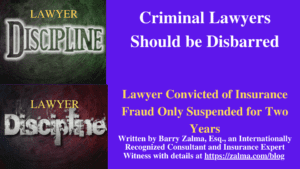Criminal Lawyers Should be Disbarred

See the full video at https://rumble.com/v1b7ctl-criminal-lawyers-should-be-disbarred.html?mref=6zof&mrefc=3 and at https://youtu.be/DGILM34Qdw0
Insurance fraud is considered, universally, as a crime of moral turpitude. Regardless, the New York State Bar was only asked to join with the New Jersey State Bar who suspended a lawyer, after he was convicted for insurance fraud and other wrongful conduct, for two years rather than being disbarr
ed.https://rumble.com/v1b7ctl-criminal-lawyers-should-be-disbarred.html?mref=6zof&mrefc=3
In the Matter of Neal Meredith Pomper, an attorney and counselor-at-law. (Attorney Registration No. 1726363); 2022 NY Slip Op 04173; No. 2021-02031; Supreme Court of New York, Second Department (June 29, 2022)
The respondent Neal Meridith Pomper was admitted to the Bar at a term of the Appellate Division of the Supreme Court in the Second Judicial Department on May 6, 1981. The Court directed Pomper to show cause why an order should not be made imposing discipline upon him for the misconduct underlying the discipline imposed by an order of the Supreme Court of New Jersey filed October 21, 2020.
The Supreme Court of New Jersey filed October 21, 2020, Pomper was suspended from the practice of law in New Jersey for a period of two years, retroactive to September 18, 2019, the date of his temporary suspension.
Pomper and the New York Office of Attorney Ethics (OAE) executed a stipulation providing in relevant part, as follows:
The respondent was admitted to the practice of law in the State of New Jersey, under the name Neal M. Pomper, in 1982. The respondent’s disciplinary history in New Jersey consists of a private reprimand in 1986, an admonition in 2004, and a censure in 2009 for assisting his paralegal in the unauthorized practice of law (In re Pomper, 197 N.J. 500, 964 A.2d 299). On September 18, 2019, the respondent was temporarily suspended from the practice of law based on the misconduct underlying this matter (In re Pomper, 239 N.J. 566, 218 A.3d 804), as set forth below.
The respondent stipulated to violating New Jersey Rules of Professional Conduct (hereinafter referred as N.J. RPC) and New Jersey Rules of Court (hereinafter rule), namely, N.J. RPC 1.15(a) (commingling), (d) and rule 1:21-6 (record keeping), N.J. RPC 8.4(b) (criminal act that reflects adversely on the lawyer’s honesty, trustworthiness, or fitness as a lawyer in other respects), and (c) (conduct involving dishonesty, fraud, deceit, or misrepresentation). The basis for the respondent’s violations stemmed from his conviction of, inter alia, insurance fraud (under Docket No. XIV-2015-0391E) and his poor record-keeping practices and commingling of funds (under Docket No. IV-2019-0136E).
THE INSURANCE FRAUD
After the respondent’s home was damaged in a flood in 2011, he contracted with Rivera Remodeling (hereinafter Rivera) to remediate the water damage. At the time, the respondent had a homeowner’s insurance policy with Selective Insurance Company (hereinafter Selective). The respondent’s employee, Larissa Sufaru, sent Rivera’s purported invoice for the remediation to Selective. Sufaru wrote “paid in full” on the invoice to reflect the respondent’s alleged payment of $14,000. Selective investigated the claim. Upon learning that Rivera had not prepared the invoice, Selective denied the respondent’s claim.
On July 10, 2015, a superceding indictment issued by a grand jury in Middlesex County charged the respondent with the following crimes:
third-degree conspiracy to commit insurance fraud;
third-degree insurance fraud;
third-degree attempted theft by deception;
fourth-degree uttering; and
fourth-degree forgery.
Pomper was found guilty of:
third-degree conspiracy to commit insurance fraud based on his agreement with Sufaru to create and transmit a fraudulent invoice to Selective to receive insurance funds;
third-degree insurance fraud based upon the respondent having directed Sufaru to create a “phony invoice” for the purpose of obtaining a benefit from Selective; and
third-degree attempted theft by deception based upon the theory that if Selective had relied on the “phony invoice,” the respondent would have received funds from Selective that he was not entitled to receive.
The respondent was found not guilty of the forgery charge.
Pomper was eventually sentenced to three concurrent one-year terms of probation with mandatory fines and avoided jail.
On or about August 28, 2018, the OAE audited the respondent’s financial records for the preceding 12-month period, which revealed the following deficiencies: client ledger cards were not fully descriptive; legal fees were not deposited into the attorney business account (hereinafter business account); improper business account designation; improper attorney trust account (hereinafter trust account) designation; noncompliant business account and trust account imaged-processed checks; and improper electronic transfers from the trust account.
The audit also revealed that on December 28, 2017, the respondent had deposited into his trust account a $5,675 check for legal fees from client Thomas Paddock (hereinafter the Paddock check). On January 5, 2018, the respondent transferred those funds into his business account.
Pomper stipulated that he commingled personal and client funds when he deposited the Paddock check into his trust account. He also stipulated to engaging in conduct involving dishonesty, fraud, deceit, or misrepresentation by placing the Paddock check into his trust account in an attempt to “reduce his tax liability for 2017 and receive the benefit of a presumably more favorable tax bracket in 2018.”
Pomper also stipulated that he had been the subject of random audits by OAE in 1987 and 2013. He had certified to OAE on April 10, 2013, that he corrected the 2013 deficiencies.
Supreme Court of New Jersey Order to Show Cause
On March 18, 2021, the Grievance Committee for the Ninth Judicial District informed the Court about Pomper’s discipline in New Jersey. The respondent did not notify the Grievance Committee and the Court of his temporary suspension in 2019 or of the discipline imposed in New Jersey in 2020.
To date, the respondent has not responded to the Court’s order to show cause, has not asserted any defenses and has not requested additional time in which to respond.
Findings and Conclusions of Law
Based on the foregoing, the court found that the imposition of reciprocal discipline was warranted based on the discipline imposed by the Supreme Court of New Jersey. In view of the circumstances of this case, the court concluded that the appropriate sanction is a suspension for a period of two years.
The New York State Bar was kind to Mr. Pomper who admitted to conviction of a crime of moral turpitude and to actions of moral turpitude by misusing client’s funds, and still he was not disbarred. Although the state may have felt sorry for him since he stipulated to his wrongdoing, a lawyer should not be allowed to practice law after being convicted of insurance fraud including creating a false document in support of a false insurance claim.

(c) 2022 Barry Zalma & ClaimSchool, Inc.
Barry Zalma, Esq., CFE, now limits his practice to service as an insurance consultant specializing in insurance coverage, insurance claims handling, insurance bad faith and insurance fraud almost equally for insurers and policyholders. He practiced law in California for more than 44 years as an insurance coverage and claims handling lawyer and more than 54 years in the insurance business. He is available at http://www.zalma.com and zalma@zalma.com.
Subscribe and receive videos limited to subscribers of Excellence in Claims Handling at locals.com https://zalmaoninsurance.locals.com/subscribe.
Subscribe to Excellence in Claims Handling at https://barryzalma.substack.com/welcome.
Write to Mr. Zalma at zalma@zalma.com; http://www.zalma.com; http://zalma.com/blog; daily articles are published at https://zalma.substack.com. Go to the podcast Zalma On Insurance at https://anchor.fm/barry-zalma; Follow Mr. Zalma on Twitter at https://twitter.com/bzalma; Go to Barry Zalma videos at Rumble.com at https://rumble.com/c/c-262921; Go to Barry Zalma on YouTube- https://www.youtube.com/channel/UCysiZklEtxZsSF9DfC0Expg; Go to the Insurance Claims Library – https://zalma.com/blog/insurance-claims-library/
Like this:
Loading…
Related





